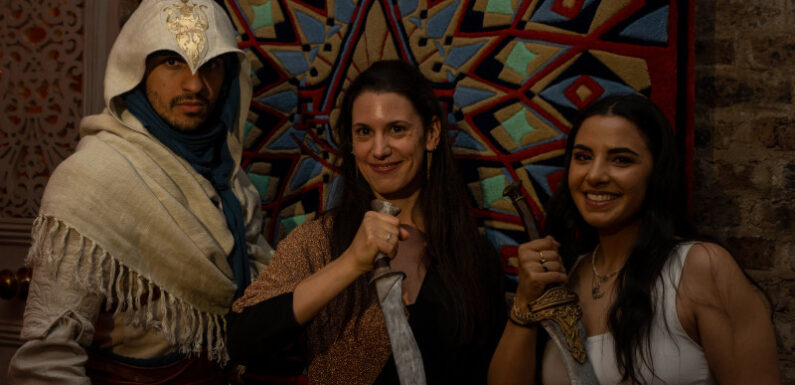
Save articles for later
Add articles to your saved list and come back to them any time.
Assassin’s Creed has clearly established itself as one of the world’s most popular games. The action-adventure series has sold over 155 million copies and inspired a feature film. Now, ahead of the release of the 13th instalment in the series, a new narrative director is guiding it through one of its most radical changes since it launched 15 years ago.
Instead of further expanding its open-world universes, which the game has been heralded for since 2013’s Black Flag, Sarah Beaulieu is taking things back to basics in Assassin’s Creed: Mirage.
“It will be a back-to-the-roots experience,” Beaulieu says. “It’s a more condensed story. It’ll have the feeling of the early Assassin’s Creed games.”
Assassin’s Creed: Mirage is the 13th instalment of the action-adventure game franchise.Credit: Ubisoft (ANZ)
Mirage is the first to be overseen by Beaulieu, and will have a deeper focus on story and stealth, a reversal fans of the original game (released in 2007) will likely embrace, given fatigue over the long-running franchise.
“A lot of us in the team were players of the early Assassin’s Creed games, so we enjoyed those more linear storylines,” Beaulieu, who has also written for other games like Beyond Good & Evil 2, says. “I like open worlds, but I’m a storyteller, and open worlds are usually not as compelling in terms of character evolution.”
Mirage’s story follows Basim Ibn Ishaq, a cunning street thief in ninth-century Baghdad, as he attempts to join the Hidden Ones, an assassin brotherhood, while being plagued by nightmarish visions from his childhood.
Sarah Beaulieu (centre) at the Assassin’s Creed: Mirage launch event.
“Basim is divided between his mission as a Hidden One and the view of the Hidden Ones, which is all about the community rather than yourself. Players will follow Basim as he evolves from street thief to master assassin, in what we call a tragic coming-of-age story,” she says.
Fans will recognise Basim as one of the antagonists in the previous title, Valhalla (2020).
There will still be open-world elements so as not to constrain players to the story, Beaulieu insists, but the game will be book-ended by linear developments.
Dr Mark Johnson, lecturer in digital cultures at The University of Sydney, says this will likely garner mixed responses.
“It sounds like it’ll be a more focused affair, which might lose a bit of the wildness and freedom enjoyed in some of the later games, but also potentially return to a more tightly developed core than what we’ve seen from the series recently.”
Marliese Sjaan, a 29-year-old from Melbourne, has been a fan since the very beginning. Though she’s excited to try Mirage, she says she’ll miss the endless possibilities offered in previous open-world series.
“I’ve heard Mirage will be about 20 hours of gameplay, or 30 hours for completionists like me, which is really short,” Sjaan says. “To compare, I probably spent like 60 or 70 hours on Origins. There’s nothing wrong with more of a storyline, but I’m normally the type of person who likes a lot of content in a game.”
That being said, this will not deter her from playing. In fact, she says it may even be refreshing having a game she can complete in just a few sessions.
No matter how much the franchise changes with each instalment, both avid gamers and non-gamers are continuously drawn to it, says the director of The University of Sydney’s Games and Play Lab, Marcus Carter.
Carter attributes this to the game’s historical elements. “All Assassin’s Creed games are devoted to recreating not just the physical buildings of historical eras, but the atmosphere of historical places,” Carter says.
For example, the first game is set during the Third Crusade in the Holy Land (modern-day Israel, Palestine, and Syria) in 1191. Assassin’s Creed 2 takes place in Renaissance Italy during the late 15th and early 16th centuries. From then on, players travel through 16th-century Constantinople, Boston during the American Civil War, the golden age of piracy in the 18th-century Caribbean, Ancient Greece and beyond.
“So many of my students have told me how Assassin’s Creed and other historical games are one of the main ways in which they understand history,” Carter says.
The Assassin’s Creed: Mirage Sydney launch event.
Its lore, which was originally inspired by Vladimir Bartol’s novel Alamut, which is itself based on the Hashashin sect of the medieval Middle East, has been continuously developing since its initial launch in 2007, which Beaulieu describes as a “gaming revolution”.
Though Mirage is looking to the past for inspiration, Beaulieu is determined to keep it moving forward, particularly in terms of representation. Many games, including Assassin’s Creed, have been traditionally light on female and non-binary characters, as well as game developers (Beaulieu is the only female director working on Mirage).
“It’s a tricky subject to talk about because when you enter this industry, you come with certain fears – and for good reason,” Beaulieu says. “But when we started talking about [Mirage’s] mentor figure, I said I would like it to be a woman in her 50s. It was never a subject – they trusted me in every way.”
Basim himself, though technically advertised as male, was also created without a specific gender in mind.
“There’s something about Basim that’s very universal and not linked to his gender,” Beaulieu says. “There’s this universal feeling of being lost in life and not being able to understand what you mean for others. I hope people will relate to Basim because of that and not his gender.”
Assassin’s Creed: Mirage is available on October 5.
Find out the next TV, streaming series and movies to add to your must-sees. Get The Watchlist delivered every Thursday.
Most Viewed in Culture
From our partners
Source: Read Full Article


